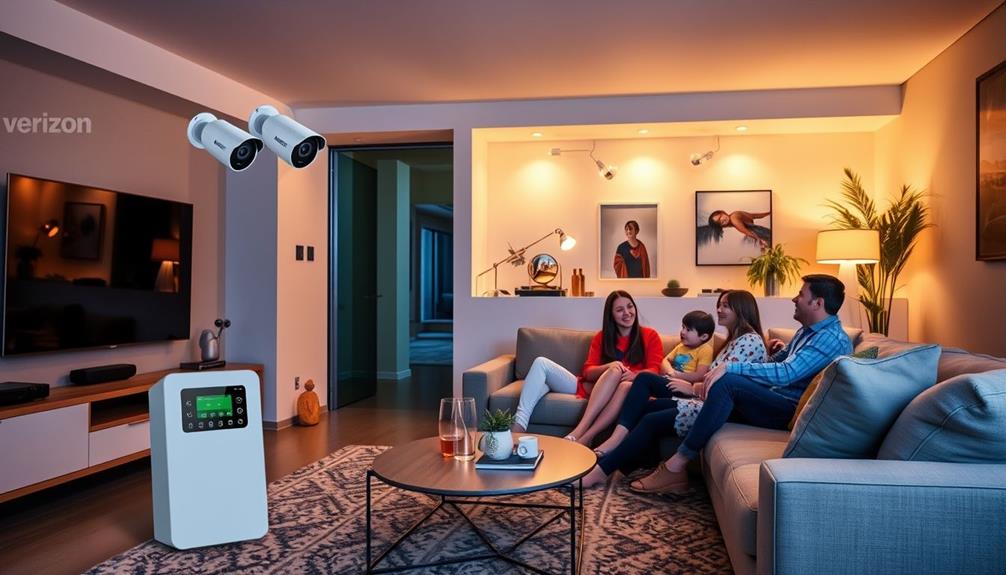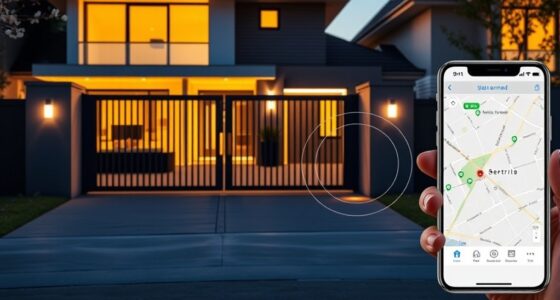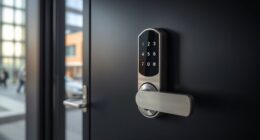A basic home security system typically costs between $200 and $600. Your expenses will vary based on equipment and installation choices. For example, DIY systems start around $200, while professionally installed systems average about $600, with additional monthly monitoring fees of $20 to $60. You can keep costs down by exploring DIY options or looking for promotions. Furthermore, activation fees might add up to $230 but can often be waived with monthly plans. If you want to learn more about how to choose the right system for your needs, keep going!
Key Takeaways
- Basic home security systems range from $200 to $600, depending on equipment and installation choices.
- Equipment packages typically cost between $199 and $599, with varying features.
- Professional installation fees add an additional $100 to $400 to the initial costs.
- Monthly monitoring fees range from $20 to $60, depending on the service provider.
Average Cost Breakdown
When considering a basic home security system, you can expect to spend anywhere from $200 to $600, depending on whether you choose a DIY setup or a professional installation. Additionally, costs may fluctuate based on the specific equipment and features you decide to include, such as cameras, sensors, or smart home integrations. For instance, the Vivint home security system price tends to be higher, often starting at around $599 due to its professional monitoring services and advanced technology offerings. Be sure to compare different options and services to find the system that best fits your budget and security needs.
The average cost of equipment packages starts around $199 and can climb to $599, with installation fees typically adding another $100 to $400 if you opt for professional help.
Once your system is set up, you'll need to factor in monthly monitoring fees, which generally range from $20 to $60. These ongoing costs can add up over time, so it's essential to include them in your budget.
Additionally, many systems require one-time activation fees that can reach up to $230, although some companies may waive these fees if you sign up for a monthly plan.
Investing in a home security system can also lead to savings on homeowners insurance premiums, with discounts between 2% and 15% available for system users.
Types of Home Security Systems

Home security systems come in various types, each catering to different needs and budgets, so you can choose the one that best fits your lifestyle. Here's a quick overview of the most common types:
| Type | Installation Cost | Monthly Fees |
|---|---|---|
| DIY Systems | Starting at $200 | None |
| Professionally Installed | Average $600 | $20 – $60 |
| Monitored Systems | N/A | $20 – $60 |
| Unmonitored Systems | Lower initial cost | None |
DIY systems allow you to install your security equipment without professional help, making them budget-friendly. On the other hand, professionally installed systems provide peace of mind through expert installation, but they come at a higher cost.
Monitored systems offer ongoing oversight, while unmonitored systems are less detailed and lack immediate professional assistance. If you're interested in smart home integration, be aware that it can increase the overall expense, as features like smart locks and environmental sensors add to basic home security systems. Consider your needs and budget to find the perfect fit!
Factors Affecting Costs

Several key factors frequently influence the costs of a basic home security system.
First, consider the installation cost. If you opt for a DIY system, you might spend as little as $100, while professional installation could range from $100 to $400.
Next, think about equipment costs. Basic home security systems typically fall between $199 and $599, and adding smart home integration can bump that price up further.
Monthly monitoring fees are another essential factor. These average between $20 and $60, but you can find some DIY options for as low as $4 per month.
Keep in mind that activation fees for monitored systems can reach up to $230, though many companies waive these fees if you commit to a monthly plan.
Your geographic location also plays a significant role in pricing. The costs of monitoring services and necessary alarm permits can vary widely, ranging from $40 to $550.
Benefits of Security Systems

When you invest in a security system, you're not just enhancing your home's protection; you're also potentially saving on insurance premiums.
Plus, having a system in place means you can count on a quicker emergency response if something goes wrong.
Let's explore these benefits and see how they can impact your peace of mind and wallet.
Enhanced Home Protection
Installing a security system not only deters potential burglars but also enhances your overall sense of safety and protection. With 87% of burglars discouraged by alarms, having a home security system can considerably reduce your risk of a break-in. Plus, visible home security measures like cameras can deter 83% of would-be intruders.
Here are some key benefits of enhanced home protection:
- Professional monitoring: This guarantees quick emergency response, giving you peace of mind even when you're away.
- Immediate notifications: Your system can alert you to smoke or gas leaks, enhancing safety for your family and belongings.
While the security system cost may include an installation fee, the long-term benefits, including increased safety and potential savings on homeowners insurance, far outweigh the initial investment. Ultimately, investing in a home security system means you're prioritizing your family's safety and well-being, allowing you to enjoy peace of mind in your daily life.
Insurance Premium Savings
Investing in a home security system not only boosts your safety but can also lead to significant savings on your insurance premiums. As a homeowner, you could save between 2% to 5% on your premiums, with some policies offering discounts as high as 15%. This is because many insurance companies recognize the deterrent effect of security systems, which lowers the perceived risk of burglary.
In addition, having a secure home can complement other protective measures, such as regular cleaning services that enhance your overall home care and security. Many homeowners find that key factors in choosing a home cleaning service also play a role in maintaining a safe environment.
A monitored security system enhances your bargaining power when negotiating insurance rates. Insurers are more likely to offer better deals if they see you've taken steps to protect your home. Additionally, the average loss per burglary is around $2,670, so having a security system is a financially prudent investment that may offset potential losses.
Moreover, some insurance policies provide coverage benefits for damages or losses incurred during a burglary, provided a security system was operational at the time. This also incentivizes installing a security system, as it not only protects your home but also contributes to your overall savings.
With these discounts and benefits, investing in a security system makes financial sense while enhancing your peace of mind.
Emergency Response Assurance
A monitored security system provides rapid emergency response, guaranteeing help arrives swiftly during crises with average monitoring times of just 30 to 45 seconds. This quick action can be vital when you're facing an emergency, whether it's a break-in or a fire.
Additionally, integrating smart home features, like garage door openers, can enhance your overall security, allowing for remote access and monitoring.
With a professional monitoring service, you gain several advantages, including:
- Immediate alerts to local authorities, increasing the chances of a timely police or fire response.
- Enhanced protection against burglars, as homes with security systems are 60% less likely to be targeted.
Additionally, the presence of security cameras acts as a deterrent, as studies show that 83% of burglars check for them before attempting a break-in.
Installation Options

When choosing a home security system, you can opt for either DIY installation, which saves you money, or hire professionals, whose fees can vary considerably based on the system's complexity.
For wired systems, professional installation is often necessary due to their complexity, with costs averaging between $800 and $1,600. On the other hand, wireless systems allow for easier DIY installation, letting you set up the system without incurring additional fees.
Some companies may waive installation fees for certain packages, especially if you contract their monitoring services, making it possible to install a system at little to no upfront cost.
However, it's crucial to take into account additional fees, such as activation fees, which can range from $79 to $99, as well as potential alarm permits that might add to your overall system costs.
Professional installation typically guarantees that all equipment, like sensors and cameras, is ideally placed for effective security coverage.
Ultimately, your choice between DIY and professional installation will depend on your comfort level with technology and your budget.
Tips for Saving Money

When you're looking to save money on a home security system, consider exploring DIY options that can cut installation costs.
Comparing multiple quotes from different providers can help you find the best deal on equipment and monitoring services.
Don't forget to look for discounts, as many companies offer promotions that can greatly lower your overall expenses.
Explore DIY Options
Exploring DIY home security options can greatly reduce your overall costs while still providing essential protection for your home. By choosing DIY home security systems, you skip hefty installation fees typically charged by professionals and can enjoy a more cost-effective solution. These systems start at around $200, compared to the average $600 for professionally installed systems.
Here are some benefits of going the DIY route:
- No installation fees: Save $100 to $400 by setting it up yourself.
- Affordable monitoring: Brands like Ring and Wyze offer basic security systems starting at $99, with monthly monitoring fees as low as $4.
With smart home devices becoming increasingly accessible, homeowners can customize their security systems to fit their needs without breaking the bank.
Plus, avoiding activation fees, which can reach up to $230 with monitored systems, provides even more savings. Opting for DIY options not only helps you stay within budget but also empowers you to take control of your home's security.
Compare Multiple Quotes
To maximize your savings on a home security system, it's wise to compare quotes from multiple providers before making a decision.
Start by obtaining quotes from at least three different companies to evaluate equipment prices, installation fees, and monthly monitoring costs. This guarantees you find the best deal tailored to your needs.
While comparing, keep an eye out for promotions and bundle deals, as many companies offer discounts for new customers. These can greatly reduce your initial costs.
Don't forget to factor in ongoing monitoring fees, which typically range from $20 to $60 per month.
If you're considering DIY security systems, they can be a budget-friendly option, starting around $200. They often save you installation costs and may come with lower monthly fees.
Before finalizing your choice, read customer reviews to confirm you're selecting a reputable provider. This research will help you avoid hidden costs and ensure you're getting the best service for your money.
Look for Discounts
Searching for discounts can greatly lower the cost of your home security system. Many home security companies provide promotional discounts that can considerably reduce your initial expenses. For instance, ADT offers 30% off new systems, potentially saving you up to $550.
Additionally, consider the following tips to maximize your savings:
- Look for bundling deals that combine equipment and monitoring services.
- Investigate financing options that let you spread installation costs over time.
Frequently Asked Questions
How Much Does It Cost to Add a Home Security System?
When you're considering adding a home security system, expect to invest between $199 and $900 initially. Don't forget about installation, monthly monitoring fees, and potential equipment upgrades that can affect your overall budget.
How Much Does It Cost to Put an Alarm System in Your House?
When you decide to put an alarm system in your house, costs can vary. You'll typically face equipment fees, installation charges, and monthly monitoring expenses, which can add up quickly depending on your choices.
What Security System Does Not Have a Monthly Fee?
Oh, the irony! You can enjoy peace of mind without those pesky monthly fees. Look into DIY systems like Ring or Wyze, or standalone devices—your wallet will thank you, while your home stays secure!
Is It Worth It to Get a Home Security System?
Absolutely, getting a home security system's worth it. You'll enjoy peace of mind, deter potential burglars, and even save on insurance. Plus, it protects your valuables, making it a smart investment for your safety.
Conclusion
So, while you might think a basic home security system's just another expense, consider the irony: investing in peace of mind can actually save you from potential losses that could cost you far more.
Imagine a burglar eyeing your home, only to be deterred by that simple system you thought was just a minor expense.
In the end, it's not just about keeping your stuff safe; it's about securing your sense of safety and tranquility at home.









